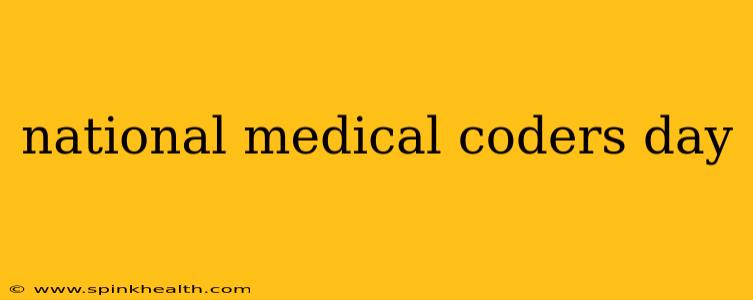October 26th marks National Medical Coders Day, a day dedicated to celebrating the unsung heroes of the healthcare system: medical coders. These individuals, often working behind the scenes, play a crucial role in ensuring the smooth functioning of hospitals, clinics, and insurance companies. Without their meticulous work, the healthcare industry would grind to a halt. But who are these essential professionals, and what exactly do they do? Let's delve into the fascinating world of medical coding and celebrate their vital contribution.
Imagine a world where doctors' notes are illegible scribbles, insurance claims are rejected due to inconsistencies, and hospitals struggle to track patient care. This chaotic scenario is precisely what medical coders prevent every single day. They are the translators, transforming the complex medical language of doctors and nurses into the standardized numerical codes that insurance companies and government agencies understand. This intricate process is the backbone of healthcare billing and reimbursement.
What Do Medical Coders Do?
Medical coders are highly skilled professionals who translate medical diagnoses, procedures, and services into standardized alphanumeric codes. They use coding systems like ICD (International Classification of Diseases) and CPT (Current Procedural Terminology) to accurately represent the patient's medical record. This process is incredibly detailed, requiring a keen eye for accuracy and a deep understanding of medical terminology, anatomy, and physiology. One misplaced digit can lead to incorrect billing, delayed payments, and even legal repercussions.
What are the different types of medical coding?
There are several different types of medical coding, each with its own specific purpose and requirements. This can include:
- Inpatient coding: Coding for patients admitted to a hospital.
- Outpatient coding: Coding for patients treated in a doctor's office or clinic.
- Physician coding: Coding for services provided by physicians.
- Surgical coding: Coding for surgical procedures.
This level of precision is critical for accurate reimbursement and the overall financial health of healthcare organizations. They are the guardians of data integrity, ensuring that every detail is accurately represented, enabling effective tracking of patient care and resource allocation.
Why is Medical Coding Important?
The importance of medical coding cannot be overstated. It's the linchpin connecting healthcare services provided with the financial compensation received. Here's a breakdown of its critical functions:
- Accurate Billing and Reimbursement: Accurate coding ensures that healthcare providers receive the correct payment for the services they provide.
- Data Analysis and Research: Coded data provides valuable insights into healthcare trends, allowing for better resource allocation and improved patient care.
- Regulatory Compliance: Medical coding ensures compliance with various healthcare regulations and legal requirements.
- Patient Care Tracking: Consistent coding supports comprehensive record-keeping, improving patient care continuity and quality.
What skills are needed to become a medical coder?
Becoming a successful medical coder demands a unique blend of skills and knowledge. These professionals must possess:
- Medical Terminology Knowledge: A deep understanding of medical terminology, anatomy, physiology, and pathology is essential.
- Coding Proficiency: Mastery of coding systems like ICD and CPT is crucial.
- Attention to Detail: Accuracy is paramount; even a small error can have significant consequences.
- Analytical Skills: The ability to analyze medical records and extract the relevant information for coding is vital.
- Computer Skills: Familiarity with various software applications is necessary.
How Can I Celebrate National Medical Coders Day?
While the day might not be a widely recognized public holiday, it presents a wonderful opportunity to express gratitude to the hardworking medical coders in your life. Simple gestures can go a long way:
- Send a thank-you note: A handwritten note expressing appreciation for their hard work is a thoughtful gesture.
- Organize a small office celebration: A small gathering with treats and drinks can show your appreciation.
- Share posts of appreciation on social media: Use the hashtag #NationalMedicalCodersDay to spread the word.
- Learn more about medical coding: Increase your understanding and awareness of this critical profession.
By acknowledging their essential contributions, we demonstrate our respect for their expertise and dedication to improving the healthcare system. So, this October 26th, let's take a moment to recognize and celebrate the vital role of medical coders. They are the unsung heroes who keep the healthcare system running smoothly, one code at a time.

